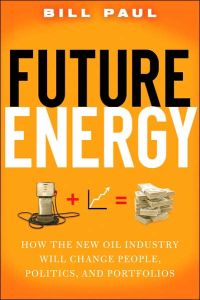Join getAbstract to access the summary!

Join getAbstract to access the summary!
Bill Paul
Future Energy
How the New Oil Industry Will Change People, Politics and Portfolios
Wiley, 2007
What's inside?
Failure to develop alternative fuels could destroy the world economy, while success could make savvy investors rich.
Recommendation
A veteran Wall Street Journal reporter, Bill Paul takes the investor’s perspective on the development of alternative energy sources. In this easy-to-understand book he explains how particular companies, industry developments and strategic forces will propel the creation of a new energy industry. He covers all the bases: Mideast politics, synthetic fuels, oil shale, and energy synergies between electric and oil. He provides practical advice, including three appendices, a glossary and, most important, a list of 100 companies that are poised to make revolutionary innovations, for speculators who are seeking the next big thing. The writing is occasionally choppy, but this is not a significant flaw in a book that getAbstract believes is full of literally valuable information, some of which might help you strike it rich.
Summary
About the Author
Bill Paul has more than 30 years’ experience reporting for outlets including the Wall Street Journal and CNBC on the economic and political impact of energy and the environment. He appears regularly on radio and television shows to discuss these issues and trends.









Comment on this summary